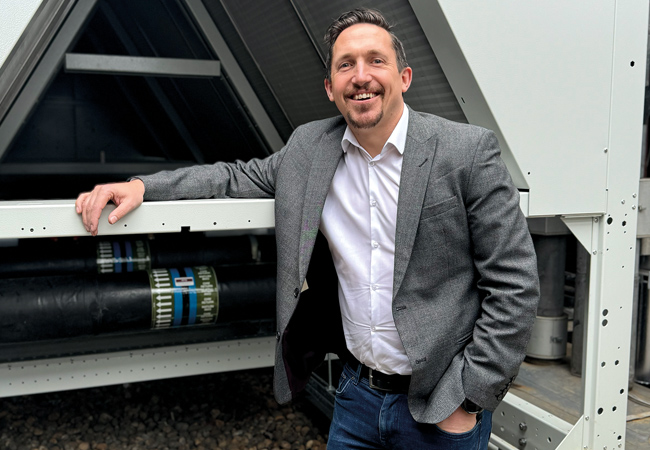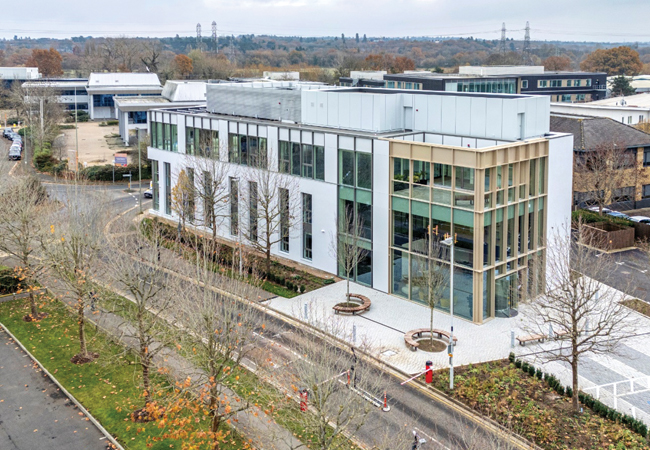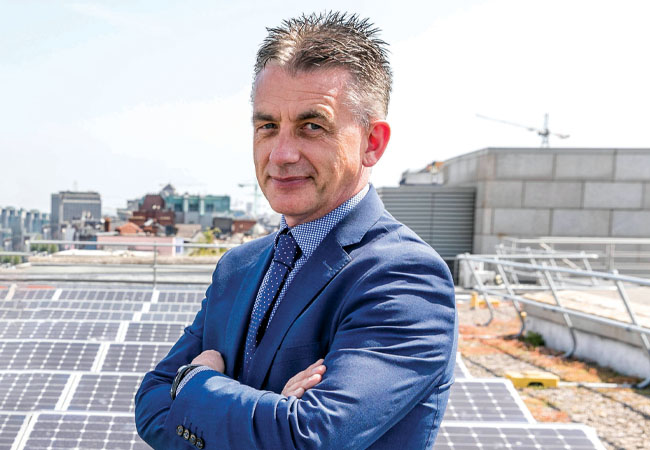
Daniel Ring says EPC makes sense because engineers can find energy savings that other disciplines cannot
Engineers are the architects of energy consumption; we are the only ones who really understand it.’ So says Daniel Ring, managing director at Lawler Consulting, the Kilkenny-based multidisciplinary consulting engineers.
‘We are uniquely positioned to reverse engineer and overlay today’s technology on yesterday’s buildings,’ he adds. ‘This is different from traditional construction engineering, and an area where the building services engineer must lead.’
Ring says his company has taken a lead on sustainability and energy consumption by adding energy-performance contracting (EPC) to the services it offers. Sustainability consulting – and EPC in particular – are fast-growing elements of this innovative engineer’s business, and a sector in which it has had considerable success in recent years. The practice, Ring says, has had to be innovative to thrive in difficult times.
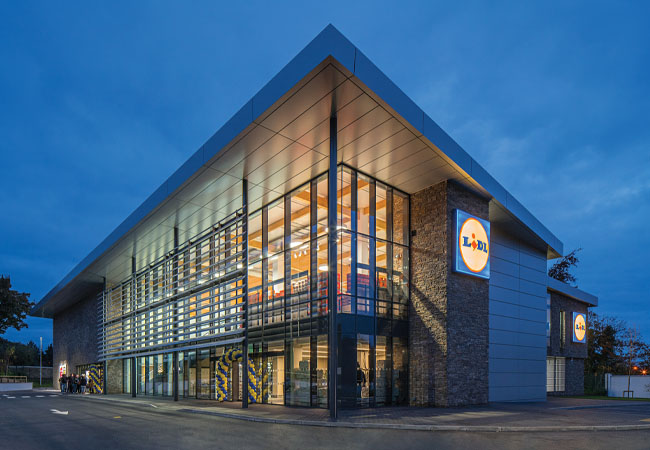
Lawler Consulting has carried out low carbon retrofits for Lidl in the UK and Ireland
Lawler Consulting was founded as Noel Lawler Consulting Engineers in 1980, by Noel Lawler. Back then, the services it offered were conventional mechanical and electrical engineering design for projects mostly based in Ireland.
Noel retired in 2005, but the business continued in his name after a management buyout, which resulted in co-directors Jason Smith and Jonathan Culleton joining the company. Business was good until 2008, when recession hit Ireland hard. ‘We went from 26 staff to six, three of whom owned the business,’ Ring recalls.
To survive, a decision was taken to diversify the markets in which Lawler Consulting worked and the nature of the work. ‘It got us into the mindset that we needed to be more resilient. An overdependency on a sector and a market creates vulnerability’ says Ring. Under the new philosophy, the practice took on work in the UK and the Middle East, and branched out into the insurance sector, where it undertook technical investigations for claims involving flooding and fires.

Lawler Consulting headquarters in in Kilkenny, Ireland
The big driver of change, however, came when Lawler Consulting started doing energy surveys for the Sustainable Energy Authority of Ireland. ‘We were finding that the great ideas we were proposing in the audits to save energy were not being realised because businesses were reluctant to act,’ says Ring. It became obvious that any initiative to unlock these potential energy savings would have to come from the engineer. ‘If we believe in it, we have to be able to demonstrate it can be delivered,’ says Ring. So began Lawler Consulting’s move into EPC.
Ring admits it is unusual for a consultancy to be involved in EPC, but he believes it makes sense because consultants can find savings that other disciplines cannot: ‘We can go right back to design fundamentals and say, “that doesn’t need to run that way”; or, “if we take out those pumps and put in these pumps, we can save this amount of energy”.’
We’re nimble and agile enough to ensure that any learning isn’t contained in a silo, but gets fed back to the entire business
To sell its EPC services, the company had to adopt a different approach to selling. ‘We had to start thinking as businesspeople and not as engineers, because we had to be able to talk to non-technical people about their balance sheet, and about cutting operating costs and improving their profit,’ says Ring.
The practice’s first EPC project was a swimming pool that had been open for about five years. ‘We looked at it and said “we think there’s an opportunity to save energy here”,’ recalls Ring. The EPC proposition is that the investment required for energy upgrades is funded from the energy savings generated by the upgrade.
‘[The memorandum of understanding] said we’d come in at our risk and at our cost to make a number of energy upgrades to the building’s mechanics and electrics, and carry out strategic building tuning, to achieve an agreed minimum energy saving,’ explains Ring.
The agreement also stipulated that, should Lawler Consulting save more energy than the agreed minimum, the cost savings would be shared equally for a set period, after which all savings would belong to the client.
Changes implemented by the engineer included the installation of variable speed drives on the pool’s air handling units. A simple energy intervention, achieved though deck-side wireless switching, also brought operational improvements, as swimming instructors previously had to shout above water features.
Engineers are the architects of energy consumption. We are the only ones who really understand it
After the success of its initial EPC, Lawler Consulting’s next venture was an eight-year contract with Dublin City Council across three leisure centres. For this project, the firm had to invest in new combined heat and power plant, boilers, pumps and heat-recovery air conditioning systems, and in upgrades to the lighting and pool plant.
The modifications were anticipated to result in a 30% annual cost saving for the leisure centre, based on ¤170,000 (£148,000) energy savings and ¤70,000 (£61,000) annual maintenance savings. Impressively, Lawler Consulting achieved savings of 42%. Unsurprisingly, it won a second EPC with the council and is in discussion with two other local authorities.
A major benefit of focusing on the operation of a facility to save energy is that it provides a feedback loop from the site to the designers. ‘We’re nimble and agile enough to ensure that any learning isn’t contained in a silo, but gets fed back to the entire business,’ says Ring.
EPC also presented the company with an opportunity to diversify further through European Union (EU) research. ‘We’ve just finished a three-year EU project, where we looked at the revenue stream generated from energy-efficiency initiatives and coupled that with a demand-response revenue stream, to help reduce paybacks on energy-efficiency projects for supermarkets and high energy users,’ Ring explains.
The practice’s next project is looking at the ‘locked-in opportunity’ for energy-efficiency improvements for landlords and tenants, when a tenant will not pay for improvements that have a payback longer than the length of their lease.
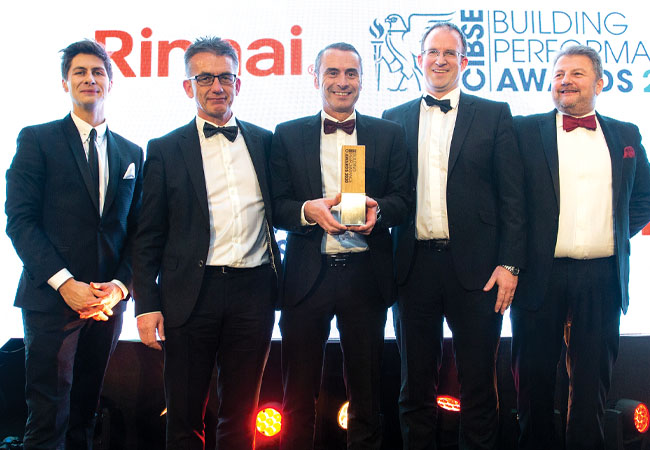
Lawler Consulting receive the 2019 CIBSE Building Performance Award
Alongside the benefits of EPC, there is a financial challenge, because the energy-efficiency modifications need to be paid for up front. ‘When we do energy contracting, we have to go to the bank to raise the funds; that sends our balance sheet south, so we need to offload that debt by wrapping it into a contract with a financier,’ says Ring, who adds that it is not difficult.
‘There is a market for this, because it is seen as a very sound investment for pension funds because of the ethical and sustainability aspects of EPC.’
The EPC team is based within Lawler Consulting’s sustainability arm, which also includes energy monitoring, targeting and reporting services. ‘Our business is currently 30% energy and sustainability and 70% traditional consulting, but I do see the pendulum swinging the other way really quickly because of the amount of enquiries from clients that want to establish a pathway to net-zero carbon,’ Ring says.
EPC also appeals to investors looking for something more responsive than standard Leed and Breeam. The in-use versions of the ratings offer evidence that gives ongoing certainty about their assets’ environmental performance, and this is an increasingly important metric. ‘They want dynamic and ongoing monitoring, which is what we can do with EPC,’ says Ring.
The company is also talking to investors about preventing stranded assets or buildings where the yield or value is falling. ‘Picking the decision-makers and pitching to them in the language they understand is very important,’ says Ring. ‘If you go to them and say “do you want to save money off your operational costs and improve the net value of your building?”, not many are going to say “I don’t want that”.’
Another major benefit of talking directly to the investment community is that a proposition will often be judged solely on its financial merits. ‘With the traditional M&E consulting business, somebody would probably go to three or four consultants [to pitch a project], whereas – in energy performance consulting – if you put forward a business case, you are seen as the delivery partner. It’s a different landscape,’ says Ring.
Strangely, Ring would welcome more competition in the EPC market because, to some clients, the benefits of EPC sound too good to be true. ‘For a landlord, energy performance contracting is risk-free – they don’t have to find the money for energy savings and, if we get it wrong, it’s our problem, so it should be easy to sell,’ he says.
‘One of the problems we have in marketing this is, because it sounds so good, landlords won’t move, because they want another price, or they feel there is a catch.’

Lawler Consulting was the building services engineer at 78 James Street, London. Amenities include an auditorium and roof-top bar
Lawler Consulting’s move into energy performance contracting has been a big part of the practice’s transformation, not least because it ensures a recurring income stream over the duration of a contract. More importantly, it’s recession-proof. ‘Even in the worst of times, you can approach a business and say “do you want me to take some pain away in terms of financial pressure? Here’s what we can do”,’ says Ring.
With new offices in Dublin, Cork and London, Lawler Consulting won Consultancy of the Year (up to 50 employees) for the second year in a row at the CIBSE Building Performance Awards.
The judges, impressed by its delivery of energy performance as a standalone service, said: ‘The transfer of risk to the consultant to provide assurance around building performance to its clients is a significant innovation’. Worthy winners indeed.
Going to great lengths in swimming pools
Leisure centres – characterised by long run hours, and high internal air and water heating loads in the pool hall – are a great opportunity to unlock significant energy-efficient revenue streams, according to Lawler Consulting’s Daniel Ring.
He says his company has come to understand their DNA through the design and delivery of many leisure projects. ‘It’s given us a unique insight and understanding of the “reverse engineering” required to extract energy wastage from these sites.
‘The introduction of responsive controls that work dynamically with building use and loadings is fundamental,’ adds Ring, who says recommissioning and seasonal commissioning are also important in tuning an engineering system and creating efficiency.
User behaviour can have a significant bearing on energy use, and making occupiers energy aware can yield large saving. Typical initiatives that Lawler Consulting introduced included: lighting and lighting control upgrades; AHU and air conditioning upgrades, AHU and air conditioning upgrades with demand-based control; heat recovery in DHW pre-heat and swimming pool heat exchangers; performance and integrity testing of existing engineering systems; behavioural assessment; and grid services integration.
‘Our understanding of the environmental interaction between the pool water, environment, air movement and the fabric, and achieving optimal control of these conditions, is integral to the successful performance of these facilities,’ says Ring.
He would like to see fabric and air leakage addressed in more retrofits, but the 25-year payback of such interventions are beyond the 5-15 years in which investors currently expect to see a return.
Ring thinks this may change in future, with building performance and digital twins being a very important part of this progression.




